
ASU+GSV Summit tackles big questions about AI, technology, education
Editor's note: We'll be updating this story daily throughout the summit.
The annual ASU+GSV Summit kicked off in San Diego on Sunday, drawing thousands of leaders for a four-day event that focuses on delivering education and workforce skills at scale.
This year’s theme is “Here Comes the Sun,” and new to the 2024 summit is a special AIR Show at ASU+GSV on AI revolution in education. The new event, which is free for attendees, takes place at the San Diego Convention Center on April 13–15 and features talks, performances and more that celebrate the ways artificial intelligence has been leveraged — from preschool through higher education.
On Monday morning, Arizona State University announced two new innovative partnerships during panels with ASU President Michael Crow.
Crow described collaborations with the University of Tennessee, Knoxville, and with Endless Network, both of which will make digital education more accessible.
Here are some panel highlights:
Tuesday, April 16
Augmented intelligence: Reimagining how the world learns
At a panel on Tuesday morning, Benedict Gomes, senior vice president for learning and education at Google, described how the technology giant has moved from serving up unlimited amounts of information to organizing information into a coherent learning experience.
Initiatives such as Study Hall — a new way to earn college credit through ASU — are curating the wide-open landscape of YouTube.
“We’re taking that curiosity and putting it onto a pathway and turning it into an outcome at ASU,” Gomes said.
Study Hall is an example of “Realm 5 learning,” Crow said.
“It’s this notion of ubiquitous, massive access to learning opportunities, knowledge and information that are available to the individual in the way that the individual learns,” he said.
“It’s a customizable, digestible learning pathway designed and structured by the individual learner.”
Gomes said Google is using augmented intelligence to create individualized learning through ShiffBot, a chatbot that augments the coding videos created by computer programmer Dan Shiffman.
“You can ask the question in the moment you’re doing coding,” Gomes said, and the bot will answer.
Crow emphasized the critical importance of using technology such as augmented intelligence to empower every individual to learn.
“What I’m driven by is how do we find a way to find the interests and talents and trajectory of each individual person and empower that?” Crow said.
“Right now in the U.S., you can predict educational outcomes based on a person’s zip code. We have to figure this out.”
Will generative AI be the world’s greatest learning acceleration?
Lev Gonick, chief information officer at ASU, told the conference crowd on Tuesday that we’re at a seminal moment with the surge of AI.
“When we last had this conversation in the spring a year ago at ASU+GSV ... the question was, ‘Would anyone be using this tool?’" he said.
“My view was, ‘Let’s ask our students.’”
It turns out that 41,000 students used ChapGPT during the four days of the exam period.
“The institutional view is to realize that there’s no putting the genie back in the bottle. The journey we’ve been on is to institutionally engage across the full breadth with 5,700 faculty.”
More than 1,700 ASU faculty members have signed up for an AI accelerator experience that will have them share their perceptions.
“There are plenty of assumptions and biases that faculty don’t want to innovate and are scared, but literally a third of ASU’s faculty signed up for this,” he said.
Quddus Pativada, founder and CEO of ASI, a company that creates AI tutors, said that the interface is the current bottleneck to student usage.
“At ASI, we’re creating interfaces to mold to what the student wants,” he said.
“Another thing is not thinking about how students access AI but the ability of AI to access the student. One of the biggest problems in education is motivation. You have a powerful technology in front of you or a powerful book in front of you, but how do you sit down and read it?”
Gonick also described how ASU is taking its Dreamscape Learn extended-reality biology lab to the next level by developing a personalized tutor within the experience.
“It’s the whole idea of finding ways to engage students so they’re motivated to learn what has been extremely complicated lab materials in biology,” he said.
The role of universities in advancing democracy
Former U.S. Sen. Ben Sasse, now the president of the University of Florida, and ASU President Michael Crow discussed how public trust in higher education has eroded and why.
Sasse said that, in 2015, 59% of Americans had trust in higher education, and that percentage fell to 36% in 2023.
“What’s even stranger is that even among parents who have kids who finished college in the last decade, only 50% think that higher education is a valuable institution, and that’s mostly due to underperformance,” he said.
Crow said that universities have not delivered on the promise of the American dream.
“All kinds of people complain about universities and when you delve into it more, they think that universities are filled with crazy people and think that universities are not listening to the public, and they think that universities are not available to them,” he said.
“Trust is down because people want our universities to be more impactful for them and we’re not delivering on that.”
The two college presidents weighed in on whether American universities are the best in the world.
“I still am of the view that there are no institutions that are as capable as American universities in adaptability, in driving forward the society and in creativity,” Crow said.
“We still have this notion in our culture of competition. In other countries, even in industrialized countries in Europe, the universities receive grants as formulas and the universities are controlled by ministries of education.
“It means in the U.S. that we have more diversity and more willingness to innovate, and unbelievable competition in everything from sports to faculty acquisition. But we have to avoid complacency.”
Sasse says he would distinguish between education and research.
“The top 50 to 100 (American universities) have unbelievable research output. It’s the glory of the world,” he said.
“Pedagogically, I’m not persuaded that a lot of institutions are earning their keep.”
Both presidents said that universities cannot be short-term landing spots for only four years in a young person’s life.
“We still let people — parents and taxpayers — perpetuate the myth that you have nothing do with the university, zero percent, and then you’re there for four years and then you leave,” Sasse said.
“We need to build a come-and-go institution where this infrastructure is connected to people’s lives.”
Crow said that universities should be involved with every family and business.
“We’re too focused on the negative, negative, negative,” he said.
“We’re far too willing to not advance American exceptionalism. This is a fledging democracy on a planet that’s lived through autocrats and dictators for tens of thousands of years. Universities need to do more things to help us make it.”
Monday, April 15
Infinitely scalable learning: Are games a new frontier?
Crow, along with Matt Dalio, the founder of Endless Network, announced the creation of the Endless Games and Learning Lab at ASU, made possible by a $5 million gift from Endless.
The Endless Lab will advance ASU's pursuit of what it terms “Realm 5 learning” — massively distributed, universally accessible, high-intensity and personalized learning solutions for all people. The Endless Lab will be part of the Herberger Institute for Design and the Arts and physically will be within the Media and Immersive eXperience (MIX) Center in Mesa.
Dalio, who met Crow at the ASU+GSV Summit two years ago, said during Monday’s panel that one of his “aha” moments was that every time he asked a computer engineer how they learned to code, the answer was “As a kid, I loved games.”
“If you can lean into the instinct that is already there, in a kid playing Minecraft, we believe you can teach youth en masse in a way never possible before,” Dalio said.
Crow said that games such as “Sims” and “Minecraft” teach complex sociological, political and management skills, and that Realm 5 learning can be done because we already have the tools to create individual pathways for each learner, every one of whom is different.
“Games are one of the pathways to enhance these learning outcomes,” he said. “Through playing games you’re learning.”
-

The AIR Show is a new event being held at ASU+GSV this year, featuring more than 400 speakers, cutting-edge tools, practical workshops, live concerts, performances and more.
Photo courtesy of EdPlus at ASU
-
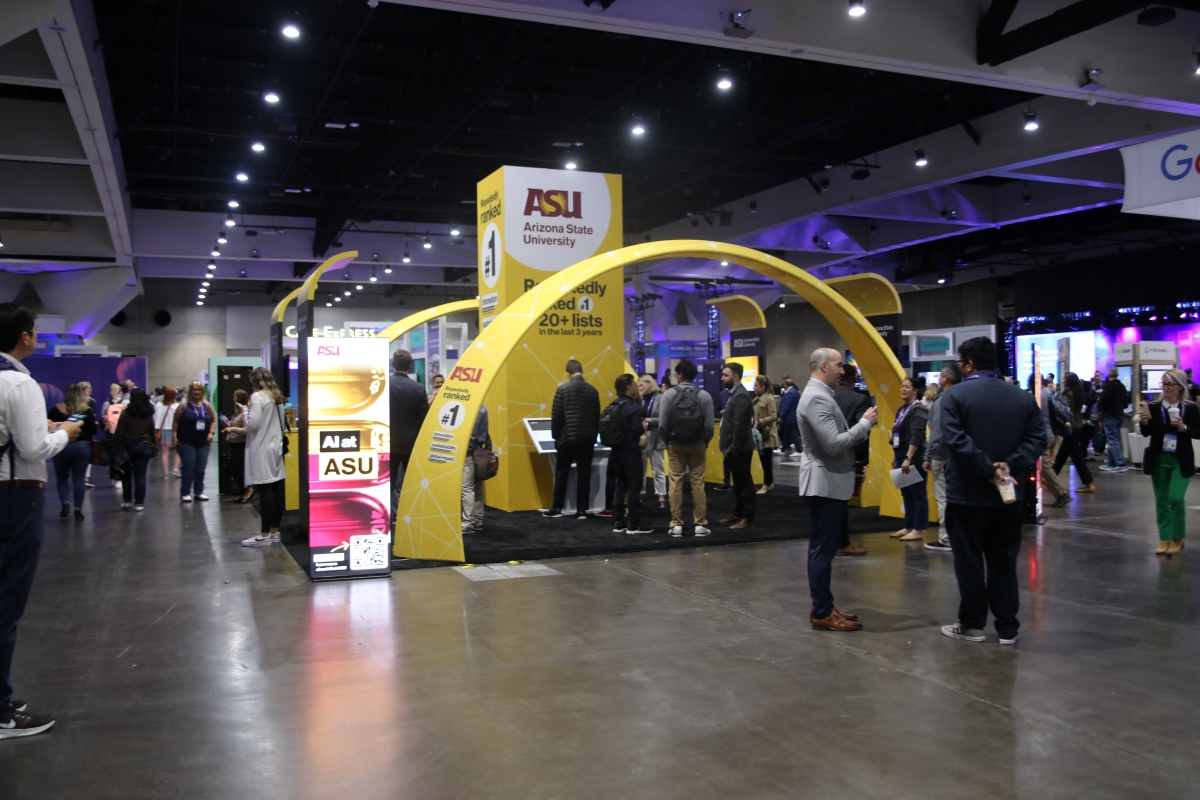
About 15,000 attendees registered for the free AIR Show event, which takes place April 13–15 at the San Diego Convention Center.
Photo courtesy of EdPlus at ASU
-
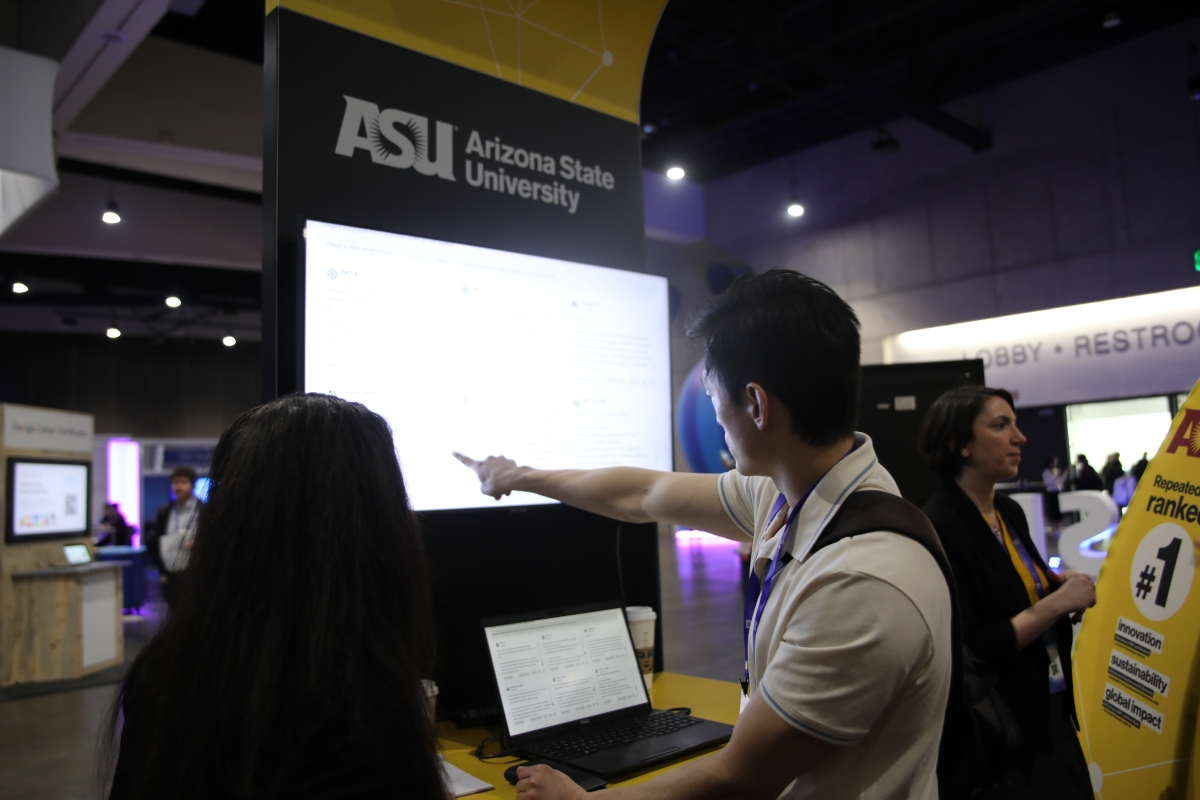
AIR Show attendees interact with the ASU booth on day one of the event.
Photo courtesy of EdPlus at ASU
-
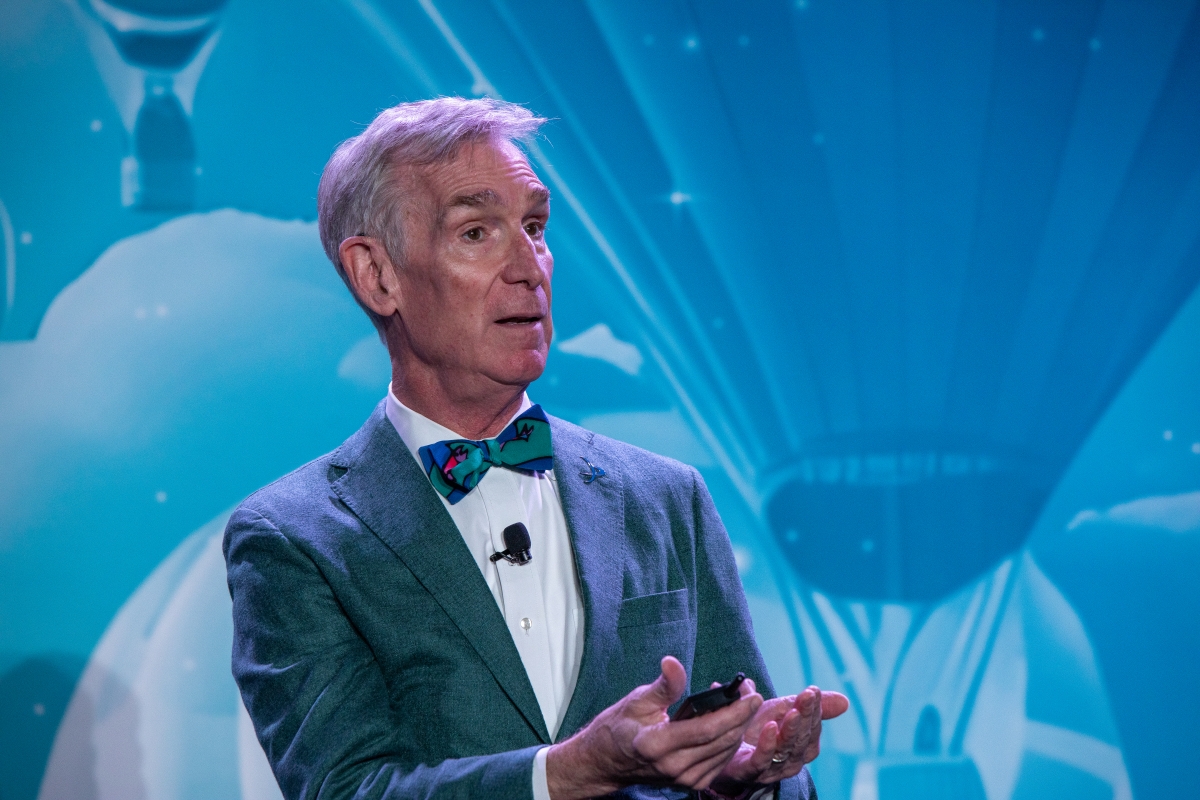
Scientist and television personality Bill Nye gave a keynote speech about artificial intelligence on April 13 during the AIR Show.
Photo courtesy of EdPlus at ASU
-
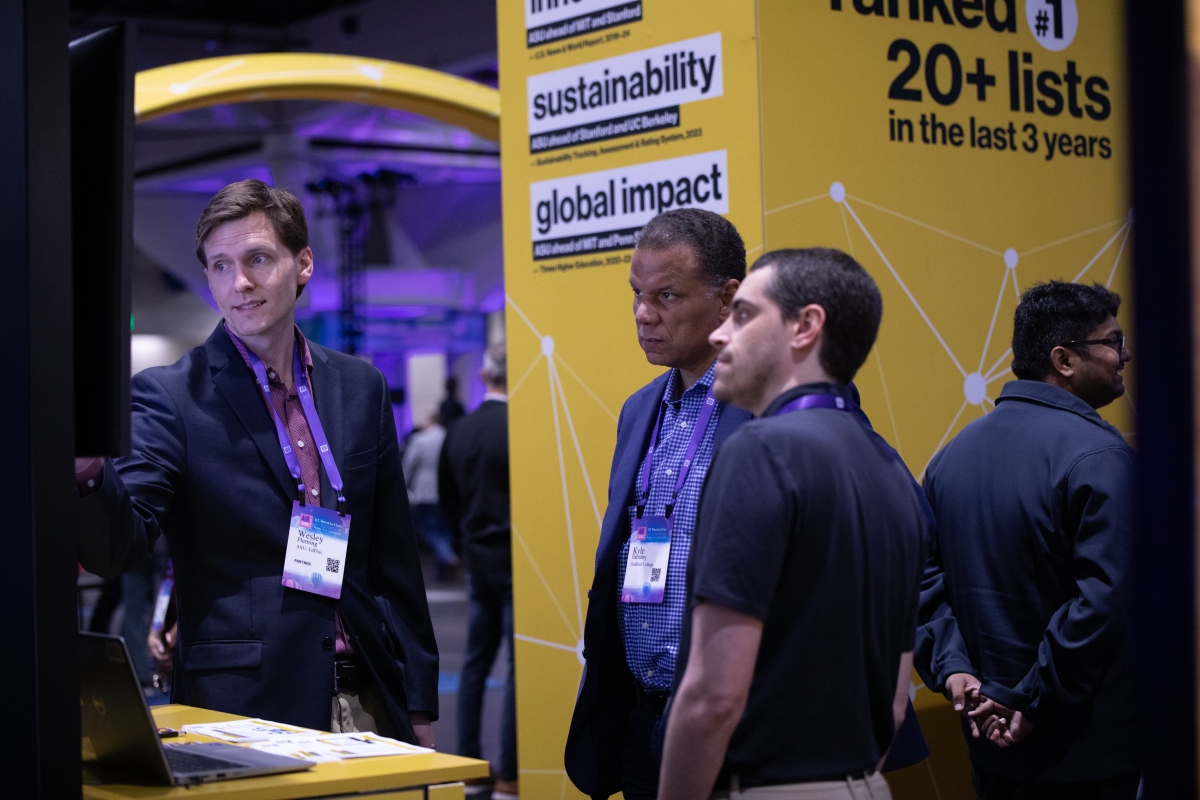
Wesley Fleming with EdPlus at ASU interacts with AIR Show attendees at the ASU exhibit on the second day of the event.
Photo courtesy of EdPlus at ASU
-
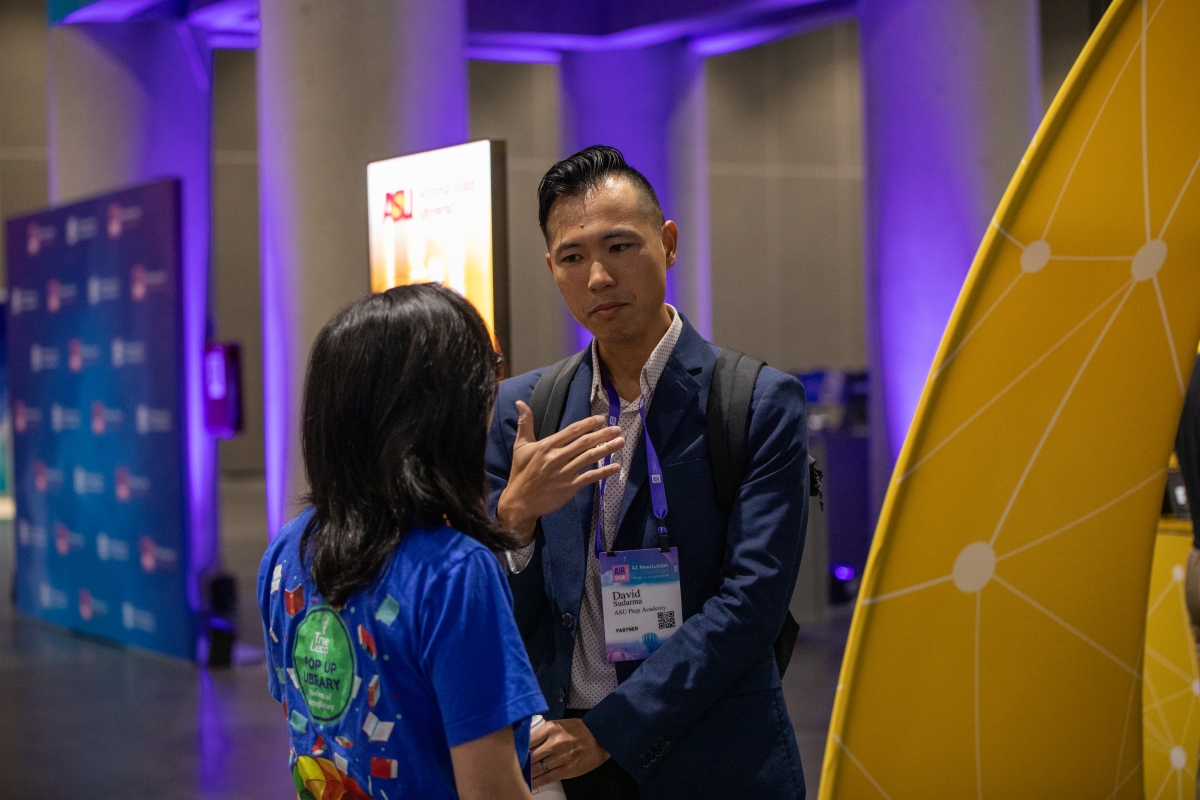
David Sudarma with ASU Prep Academy speaks with an attendee during the second day of the AIR Show.
Photo courtesy of EdPlus at ASU
-
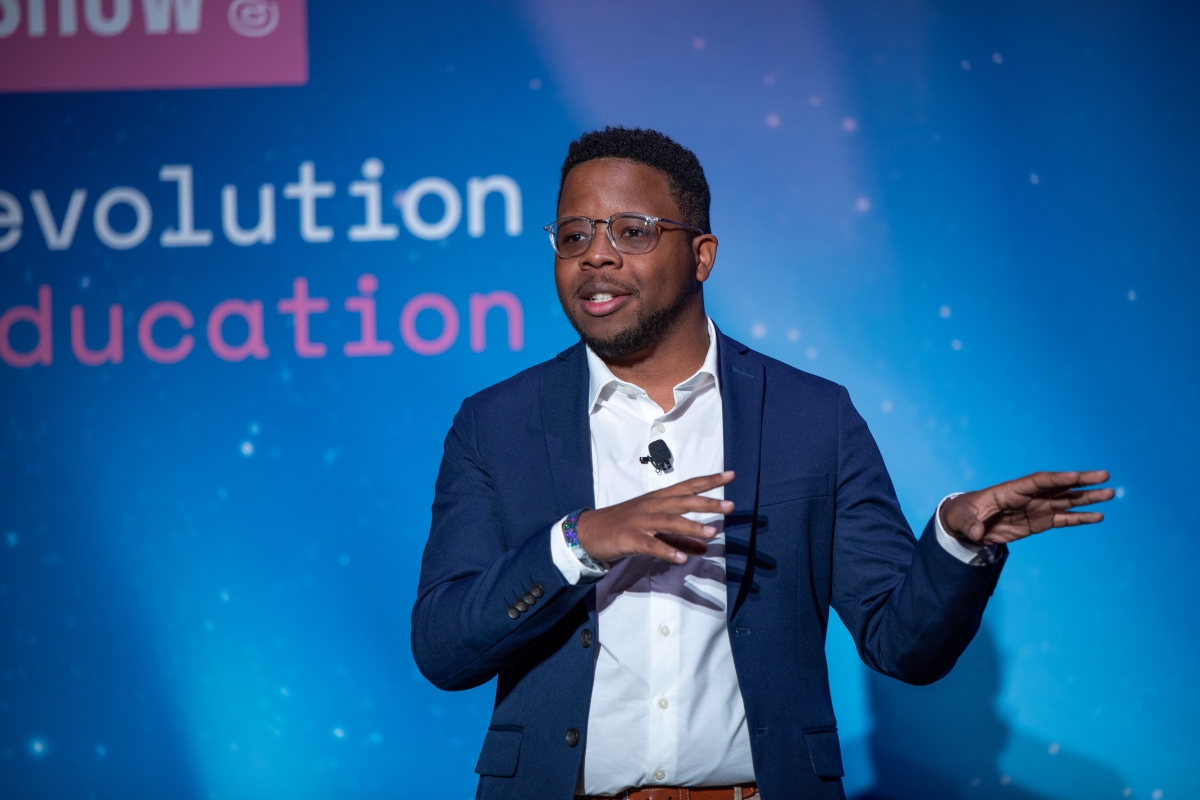
Auryan Ratliff, director of creative and emerging technologies at EdPlus at ASU, gives a presentation on ASU's Degree Recommendation Engine during the AIR Show on April 14.
Photo courtesy of EdPlus at ASU
-
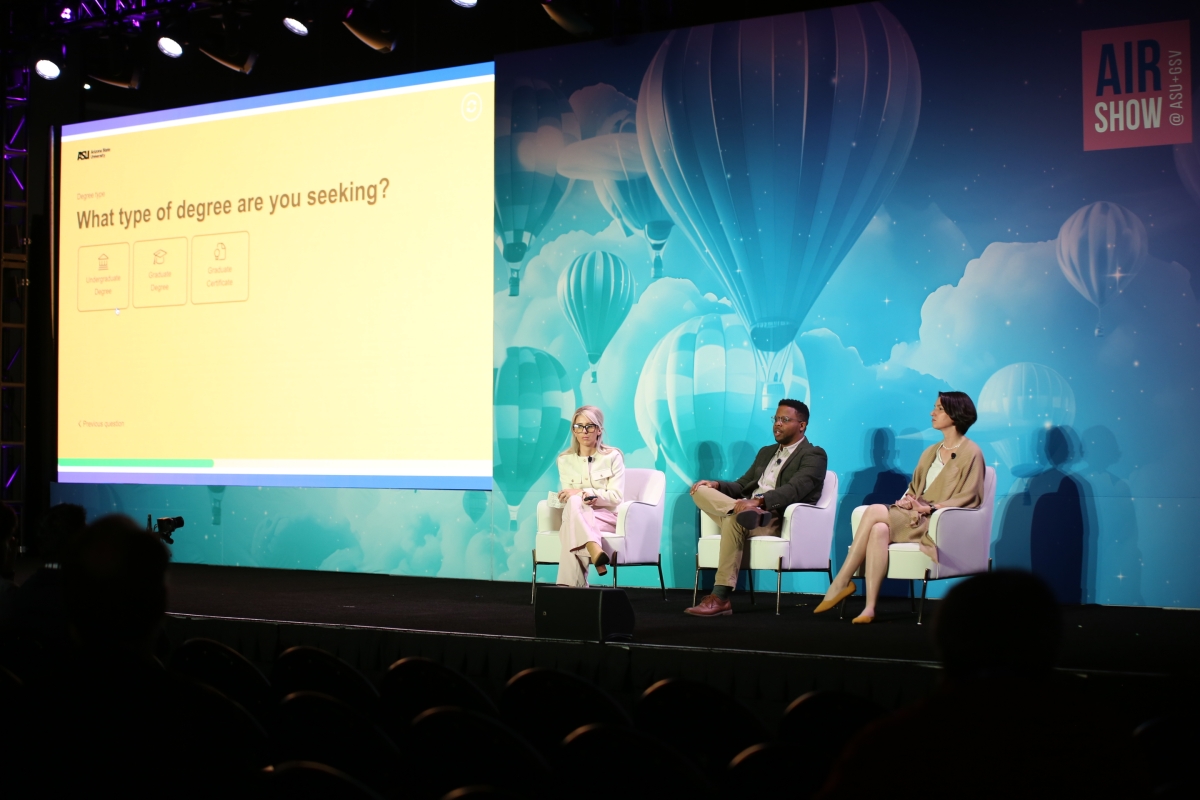
From left: Amanda Gulley, chief of product and user experience at EdPlus at ASU; Auryan Ratliff, director of creative and emerging technologies at EdPlus at ASU; and Elizabeth Reilley, executive director of AI acceleration at ASU Enterprise Technology give a presentation on AI strategy tips during the AIR Show on April 15.
Photo courtesy of EdPlus at ASU
-
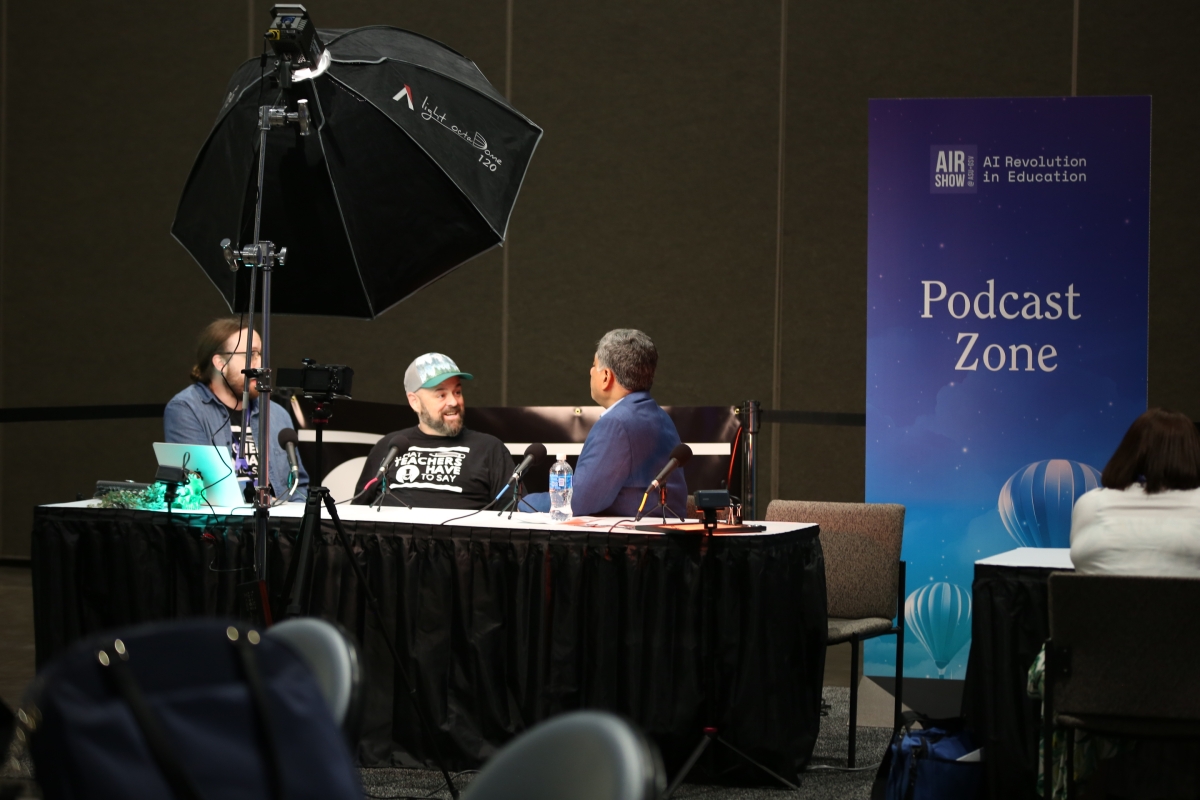
Podcasters record from the Podcast Zone area during the AIR Show at the ASU+GSV Summitt.
Photo courtesy of EdPlus at ASU
The new center will close the quality gap between popular games and games that have been developed specifically to educate.
“Pillar one is to look at how you bridge the gap from the perspective of the craft of game making — it’s an art to make games,” Dalio said.
“Then there’s the entrepreneurial perspective. How do you build a business model that sweeps the world?
“And then there is the academic perspective. What is the research and science behind it?”
Crow said that the new technology will better teach subjects such as the “hard sciences,” which have been considered difficult to learn and teach.
“How do we enhance learning so no human is left behind because of some human construct?” he said.
“How do you take the supercomputer that is the human mind and empower it in every possible way? We now have the capability to build those things.”
The future of education at scale
Crow said that there’s resistance to the massive technological changes ahead because people can’t believe that new processes can be better.
“If you take a person like myself, my tools were a pencil, a piece of paper, a slide rule and a book. Those are unbelievable ways of learning. But if you’re educated in that one realm, it’s difficult to imagine the next realm,” he said.
He also said that with new AI technologies, students must be viewed as co-creators in the learning experience.
“I talk to my AI tool and it talks back to me or draws images of things. There’s nobody involved but me and this tool. We have to have a different kind of status for students going forward.”
Michael Hansen, CEO of Cengage Group, said that while gaming is a way to teach and engage the human mind, the relationship between teacher and student will remain central.
“We need to figure out how these platforms can enhance that relationship, but frankly, over half of students in our education system don’t have access to that,” he said.
He said that faculty need to be trained on new technology tools.
“But 70% of faculty in the U.S. are adjunct,” he said.
“They’re very hard-pressed for time and don’t want to spend hours to learn something new. We have to make it easy to learn and save them time so they can focus on teaching students, particularly those that are advanced and those left behind.”
Doug Becker, founder and CEO of Cintana, said that AI can simultaneously widen and close the equity gap in education.
“AI tutors give lie to the idea that students go online as a shortcut and a cheat. It’s the opposite,” he said.
Breaking barriers and empowering students
ASU and the University of Tennessee, Knoxville, are announcing a collaboration to make it easier for more adults to get a high-quality college degree. The two universities will co-design new education opportunities and develop solutions to support the workforce needs of their respective states and surrounding regions.
Starting in fall 2024, University of Tennessee, Knoxville, students studying fully online will have access to a selection of general education courses through the ASU partnership that previously had not been available, allowing direct access to nine fully online undergraduate degree programs.
The course exchange will allow the University of Tennessee to more quickly develop online degree programs, and academic units at both institutions will have the opportunity to collaborate with their counterparts in designing and launching new programs at each school or even jointly.
At the ASU+GSV Summit on Monday, Donde Plowman, chancellor of the University of Tennessee, said that her university is behind in developing an online learning initiative. She was intrigued by Crow’s offer to partner and his advice to focus on undergraduate degree programs.
“Michael said that if you’re going to help the socioeconomic situation in Tennessee, that’s where you have to start,” she said.
“We have 100,000 people in Tennessee who have degree credit but no degree. In the last year alone, we’re attracting businesses like crazy — 77,000 new businesses in one year. And the fastest growing segment where there’s a need for employment is the four-year college degree segment.”
She said that her university will learn from ASU’s experience in developing EdPlus, which is approaching the milestone of 100,000 graduates.
Crow said that large social problems are bigger than any individual higher education institution.
“We’re not profit seekers. We’re social outcome seekers. We have for-profit partners we work with and for-profit vendors we purchase from,” he said.
“But we can work together to focus only on students and not worry about whether shareholders are satisfied with the return on the venture.”
Crow said that ASU will learn from the University of Tennessee.
“Every university has spikes of excellence, with clusters of faculty that are better than others or individual programs that are unique,” he said.
“We’re hoping to find ways to leverage the University of Tennessee’s expertise and faculty knowhow on solving problems. We think there should be more alliances, more partnerships and more joint degrees.”
Making an impact in California: Higher education leaders on learning and the edtech revolution
Sonya Christian, chancellor of the California Community Colleges, described her system’s “Vision 2030” and what it means to be truly open access.
“We have 2 million students, the largest higher education system in the U.S. Yes, we take everyone who comes to us, but what about the 6.8 million Californians who have a high school diploma but no college credit and are in low-income jobs with no hope for economic mobility?
“Vision 2030 is not about building it and they’ll come, but if you’re open access with equity, we have to find those who haven’t found their way to college and bring college to them.”
That will require technology, she said.
“There is a promise and anticipation that the AI tool can raise the profiles of a large number of individuals rather than have the elites, the stratification,” she said.
The California Community Colleges are signing data-sharing agreements with large employers to facilitate the process of awarding credit for work experience to large numbers of workers.
“If you have a health care aide, you have to recognize the learning that happened in her 10 years of work,” she said.
Crow said it has only been within the past 100 years that society decided that high school was necessary.
“What Sonja’s talking about is hard for people to get their arms around,” he said. “The California Community Colleges have taken the lead in figuring out how to be ubiquitously present for everyone.
“We have to find a way to look at learners as the unit of analysis, not the college or the university or the state.
“We made egregious social errors by not continuing the learning process. If you want to drive up the American economy, drive up wages, drive up the standard of living, drive up income, drive up the competitiveness of the U.S., we must find a way to make every person an engaged learner at scale.”
EIN Presswire does not exercise editorial control over third-party content provided, uploaded, published, or distributed by users of EIN Presswire. We are a distributor, not a publisher, of 3rd party content. Such content may contain the views, opinions, statements, offers, and other material of the respective users, suppliers, participants, or authors.

